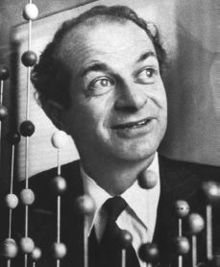Linus Pauling
Linus Carl Pauling (28 Februar 1901 – 19 August 1994)[4] wis an American chemist, biochemist, peace activist, author, an eddicator. He published mair nor 1,200 papers an beuks, o that aboot 850 dealt wi scienteefic topics.[5] New Scientist cried him one o the 20 greatest scientists o aw time,[6] an as o 2000, he wis rated the 16t maist important scientist in history.[7]
Pauling wis ane o the foonders o the fields o quantum chemistry an molecular biology.[8] His contreibutions tae the theory o the chemical bond include the concept o orbital hybridisation an the first accurate scale o electronegativities o the elements. Pauling an aw wirkit on the structurs o biological molecules, an shawed the importance o the alpha helix an beta sheet in protein seicontar structur. Pauling's approach combined methods an results frae X-ray creestallografie, molecular model biggin an quantum chemistry. His diskiveries inspired the wark o James Watson, Francis Crick, an Rosalind Franklin on the structur o DNA, that in turn made it possible for geneticists tae crack the DNA code o aw organisms.[9]
In his later years he promotit nuclear disairmament, as weel as orthomolecular medicine, megavitamin therapy,[10] an dietar supplements. Nane o the latter hae gained muckle acceptance in the mainstream scienteefic commonty.[6][11]
For his scienteefic work, Pauling wis awairded the Nobel Prize in Chemistry in 1954. For his peace activism, he wis awairdit the Nobel Peace Prize in 1962. He is ane o fower individuals tae hae wan mair nor ane Nobel Prize (the ithers bein Marie Curie, John Bardeen an Frederick Sanger).[12] O thir, he is the anerly person tae hae been awairdit twa unshared Nobel Prizes,[13] an ane o twa fowk to be awairdit Nobel Prizes in different fields, the ither bein Marie Curie.[12]
References
eedit- ↑ a b Linus Pauling at the Mathematics Genealogy Project
- ↑ a b "A Guggenheim Fellow in Europe during the Golden Years of Physics (1926-1927)". Special collections. Oregon State University Libraries. Retrieved 18 December 2013.
- ↑ Pauling, Linus (1925). The determination with x-rays of the structures of crystals (PhD thesis). California Institute of Technology.
- ↑ Dunitz, J. D. (1996). "Linus Carl Pauling. 28 February 1901-19 August 1994". Biographical Memoirs of Fellows of the Royal Society. 42: 316–326. doi:10.1098/rsbm.1996.0020. PMID 11619334.
- ↑ Pauling, Linus (1997). Pauling, Jr., Linus (ed.). Selected papers of Linus Pauling (Volume I ed.). River Edge, NJ: World Scientific. p. xvii. ISBN 978-9810229399.
- ↑ a b Horgan, J (1993). "Profile: Linus C. Pauling – Stubbornly Ahead of His Time". Scientific American. 266 (3): 36–40. Bibcode:1993SciAm.266c..36H. doi:10.1038/scientificamerican0393-36.
- ↑ Simmons, John (1996). The scientific 100 : a ranking of the most influential scientists, past and present. Secaucus, NY: Carol Publ. Group. ISBN 978-0806517490. Archived frae the original on 9 Julie 2017. Retrieved 26 Mey 2015.
- ↑ Rich, A. (1994). "Linus Pauling (1901–1994)". Nature. 371 (6495): 285. Bibcode:1994Natur.371..285R. doi:10.1038/371285a0. PMID 8090196.
- ↑ Gribbin, J (2002). The Scientists: A History of Science Told Through the Lives of Its Greatest Inventors. New York: Random House. pp. 558–569. ISBN 978-0812967883.
- ↑ Stone, Irwin (1982). The healing factor: "vitamin C" against disease. New York: Perigee Books. ISBN 978-0-399-50764-9.
- ↑ Offit, Paul (19 Julie 2013). "The Vitamin Myth: Why We Think We Need Supplements". The Atlantic. Retrieved 19 Julie 2013. Italic or bold markup not allowed in:
|publisher=(help) - ↑ a b "Linus Pauling – Biographical". Nobel Foundation. Retrieved 5 August 2007.
- ↑ "Nobel Prize Facts". Nobelprize.org. Nobel Media AB. 2014. Retrieved 14 Januar 2017.

